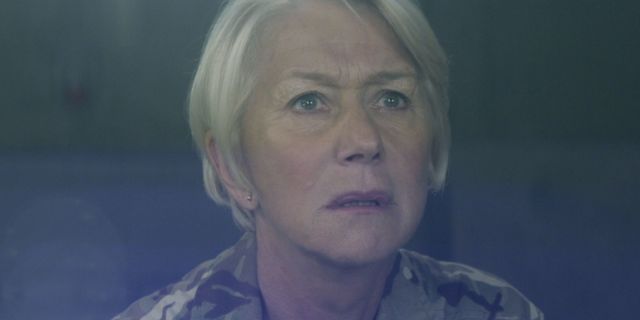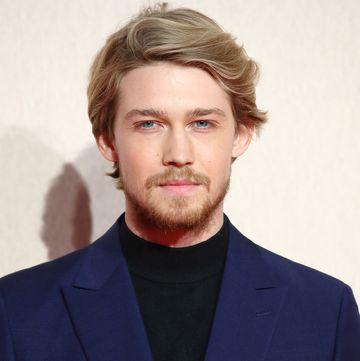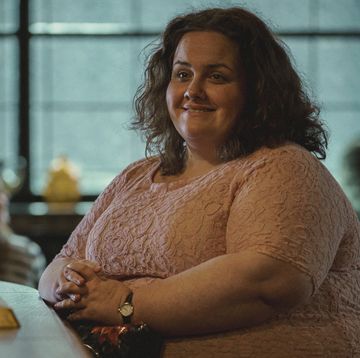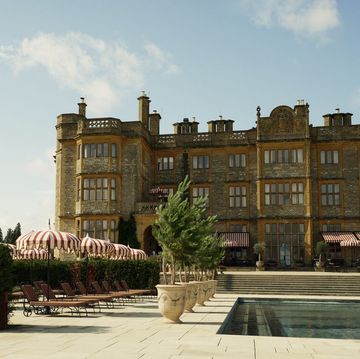In Eye In The Sky, Helen Mirren embodies Colonel Katherine Powell, a British military commander tasked with a top secret drone operation in Kenya. The film, available now on Digital HD and on Blu-ray and DVD on June 28, uses that story to raise questions about contemporary war and what it means to wage attacks from the sky. As Powell, Mirren is a powerful force, but also one who takes her responsibility for human lives very seriously. It's a new facet of the actress, who appeared as a very different sort of powerful female character in last year's Woman In Gold.
Next up: Mirren will head into the Fast and Furious franchise, joining Vin Diesel and crew for the eighth film in the series, out in 2017. While both the actress and Diesel have teased her involvement, reportedly as the movie's villain, Mirren exclusively confirmed her casting to us as she discussed her career and what she learned from making Eye In The Sky.
What made you say yes to this role initially?
I thought it was a very wonderful, nuanced, interesting war movie. Women don't get asked to be in war movies very much, let alone play the lead in a way. So those two things. I think the war movie genre is a very important genre in film. Film gives you a visceral experience of something that you would never otherwise experience. To give the audience a real feeling of what maybe a certain kind of warfare would be like I thought was great. It was a great script.
Have you been offered roles like this before?
No! Can you think of me of a strong military leader before? I guess I did Queen Margaret in Henry VI Part III–she's quite the strong military leader come to think of it. I did have to wear medieval chain mail for that one.
Did you do a lot of research for this?
Yes, absolutely. Of course. I spent some time with a military fighter. We had him on the set a lot of the time. What I didn't experience was being able to speak to a female commander and I think that would have been interesting. But obviously I had to have a real sense of who this woman was, where she came from, what brought her to this point, what qualities would she have to have had to have risen this high in the military?
What do you think motivates her?
When you're young you think, 'Oh, what do I want to be?' I thought, 'I want to be an actress.' But some young women think 'I want to be in the military' and she would have very much been one of those people. And then once you're in there another set of things come into play–it's not what your dream is but how do you make this work? What skills do you have to develop to be good at this job? Those were the sort of things I had to think about. Maybe it was because I was playing that role so I had to believe that whatever her decision ultimately was was the right decision, but I did feel that her decision was the right decision. It's an incredibly difficult decision, but people in the military have to make these decisions in a split second. They have to be those sorts of people who have the capability of doing that.
You can't be someone who caves under any sort of pressure.
Absolutely. And incidentally I don't think women are any better at it or, more importantly, any worse at it than men are. Human beings make mistakes, so we all make mistakes and wrong decisions. Being able to make a decision and act upon it is not gender specific.
Had you considered the issues about war raised by the film before being involved?
No. You know, honestly, I didn't really have an understanding of how this modern-type of warfare is propagated. I think it's very much the way warfare will go in the future. It will become much more specific and targeted, and less general than it was in the past. Is that a better thing or a worse thing? I don't know. It opened my eyes to how this kind of warfare is conducted. In terms of this specific operation with these specific circumstances that is exactly how the thing would develop. All of that was very closely researched. I think all we can do with drones is realize they are with us and not bury our heads in the sand about it, [we should] say, 'Okay, how do we regulate this?'
Do you think the film poses any answers to the questions it raises about drone warfare?
It's very much about asking the questions. That's what I loved about the script and the film. It didn't make up your mind for you. It's a film that throws up questions. We want people to leave the cinema talking about what they would do in that situation and what they think was right and what they think was wrong.
You mentioned war movies earlier. For you, why is it so important for Hollywood to make these sorts of movies?
A war film can be propaganda and they're very valuable as propaganda, as we realized in Britain in the Second World War. Film as propaganda is a very valuable tool. It can also demonize, which is the dangerous side of a war film as propaganda. But there are war films that are not propaganda. It's just saying 'This is what it's like.' For 99 percent of us we don't know what it's like. We have no idea. So to reveal that to the audience is powerful. Film is a visceral experience so I think a good war movie is a valuable tool for making us understand what our military goes through, what the issues are, the good and bad sides of war and what we're asking our military to do.
Most war movies are just about the men, which makes this one feel very different.
Yes, very much so. And of course, originally my part was written for a man. And in terms of the drone pilots, a lot of them are women. Women are very good at that because their fingers move fast and they have quick reactions. So a lot of the drone pilots actually are women–I don't what percentage. It's only comparatively recently that women have been allowed to fight on the front lines. Obviously, historically, if you watch a movie about the Vietnam War or the Korean War it's going to be all about the men without question. Maybe with a few female nurses thrown in.
How does this film fit in with what you want to be doing in your career overall?
It fits in very, very well with what I want to be doing. I want to be making film and theater, but film is particularly relevant. I like it to be serious. Of course, having said that I'm about to do Fast and Furious 8. But that's for the fun of it. So maybe that's what I want as well, some fun and some relevant, serious, important movies.
So you are confirmed to be in 'Fast 8'?
Yes, I am.
Are you a fan of cars?
Well, yes. I've always rather loved driving. I said, 'I'll be in it, but only if I'm allowed to drive if I do drive in it.' But we'll see. We'll see how it transpires. Film is a wonderful thing and it can be so many different things. I don't want to turn my back on any of the different ways movies can be. I love the movies. I love going to the films. I like very serious films, I love foreign films, and I love big, fun movies–as long as they're well made and they've got good scripts. That's the most important thing.
Originally posted by Emily Zemler













